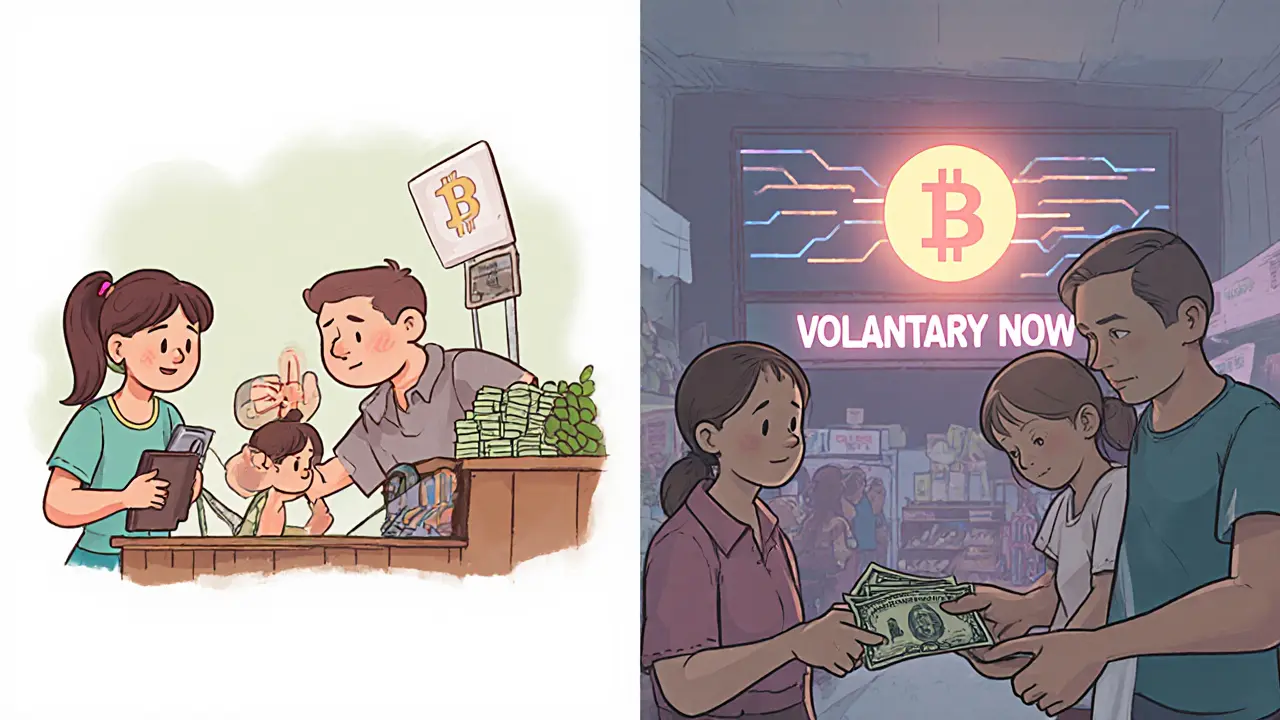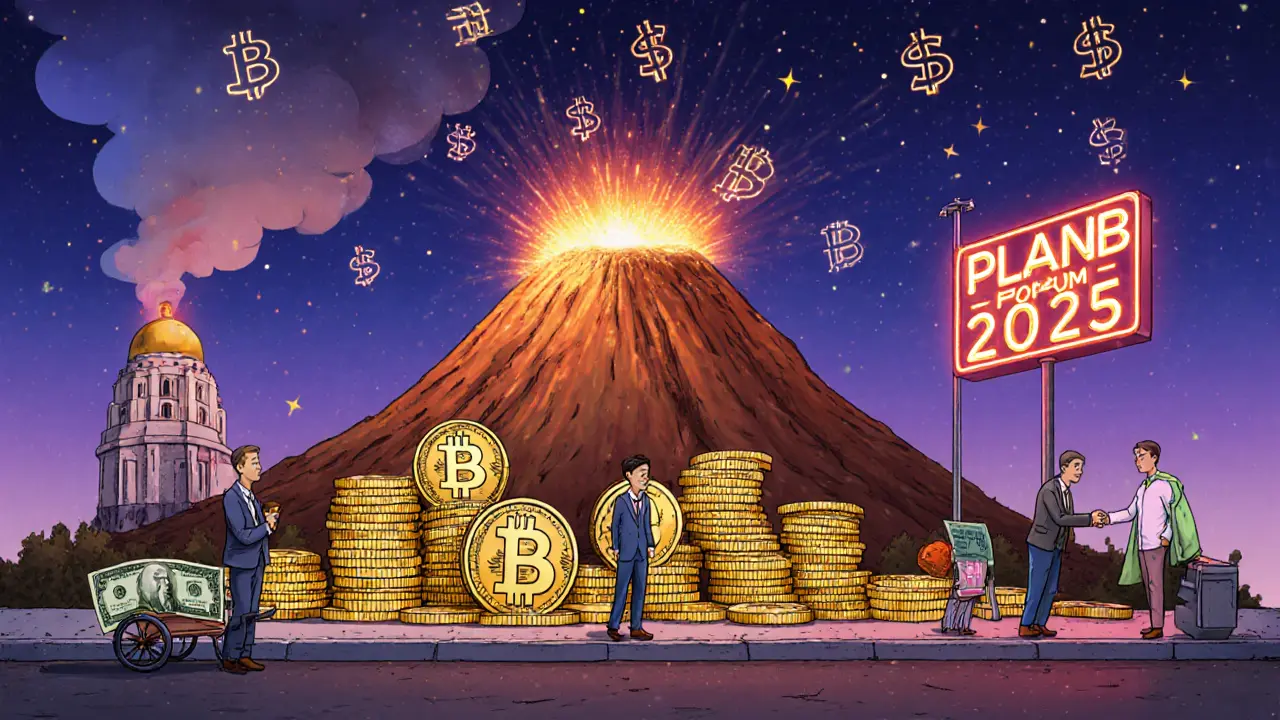El Salvador Remittance Fee Calculator
The article explains how El Salvador attempted to use Bitcoin to reduce remittance costs. This calculator shows the potential savings from using Bitcoin instead of traditional services. Note: The Bitcoin fee shown is based on the Lightning Network.
Your Savings
Traditional Remittance Fee (5%): -
Estimated Bitcoin Fee (Lightning Network): -$0.01
Total Savings: -
On September 7, 2021, El Salvador did something no country had ever done: it made Bitcoin legal tender alongside the U.S. dollar. President Nayib Bukele called it a revolution. Supporters said it would help the unbanked, cut remittance fees, and attract tech investment. But by May 1, 2025, the law had been quietly rewritten. Bitcoin was still called legal tender-but businesses no longer had to accept it. Taxes couldn’t be paid with it. The government stopped pushing it. And the world watched as the first real-world experiment in national cryptocurrency adoption collapsed under its own weight.
Why El Salvador Chose Bitcoin
El Salvador’s economy has been tied to the U.S. dollar since 2001. That meant no control over monetary policy, no ability to print money, and no safety net during crises. Remittances made up nearly 25% of GDP, mostly sent from the U.S. by Salvadorans working abroad. Sending $200 home cost an average of $10 in fees-5% of the amount. The government claimed Bitcoin could fix that. By cutting out middlemen, using the Lightning Network, people could send money instantly and cheaply.The plan was simple: install the Chivo wallet on every phone, give everyone $30 in Bitcoin to start, and make it mandatory for businesses to accept it. The government promised financial inclusion. Nearly half the population didn’t have a bank account. Bitcoin, they said, could leapfrog traditional banking.
The Launch Day Disaster
The first day didn’t go as planned. Bitcoin’s price dropped 10% within hours. The government, trying to stabilize the market, bought more Bitcoin-losing $3 million on paper before lunch. The Chivo wallet crashed. Servers couldn’t handle the load. People couldn’t register. The app went offline for hours.Over 1,000 protesters gathered outside the Supreme Court. They carried signs: “No to Bitcoin.” “We want dollars.” Many didn’t understand how it worked. Others feared volatility. Some had seen scams before. The government’s response? Double down. They added discounts: 20 cents off per gallon at gas stations if you paid with Chivo. Restaurants offered free desserts. Still, adoption stayed low.
Adoption Numbers That Didn’t Add Up
The government bragged: 3 million downloads in the first month. That’s 46% of the population. Sounds impressive. But downloads aren’t usage. A year later, only 12% of Salvadorans had actually used Bitcoin to buy something. By 2024, that number had dropped to 8%. Nine out of ten people never used it for daily transactions.Businesses didn’t want it. A 2022 survey found 93% of companies received zero Bitcoin payments. Even large firms barely accepted it. Only 20% of big businesses did. And when it came to paying taxes? Just 5% of citizens tried. The government had to keep refunding people who paid in Bitcoin because the system kept failing.
The Chivo wallet became a symbol of the failure. It was hacked multiple times. Users lost funds. The government blamed third-party providers, but trust was gone. People didn’t trust a digital wallet run by a state that couldn’t even keep its own app running.

The IMF’s Role in the Reversal
By late 2024, El Salvador was in trouble. Debt was rising. Inflation was creeping up. The country needed a $1.4 billion loan from the International Monetary Fund. The IMF said: “No Bitcoin as legal tender.”The IMF’s report was blunt. Bitcoin’s volatility made it unfit for a national currency. It created uncertainty for businesses, complicated fiscal policy, and exposed the country to uncontrolled financial risk. The IMF didn’t say Bitcoin was bad. It said forcing it into daily use was reckless.
On January 29, 2025, the Salvadoran legislature voted 55-2 to change the law. The word “currency” was removed. Bitcoin was no longer required for payments. Taxes couldn’t be paid with it. The government stopped promoting it. The Chivo wallet was no longer mandatory for government services. The law didn’t ban Bitcoin-it just stopped forcing people to use it.
What Changed After May 1, 2025
The new rules were clear: Bitcoin is still legal tender, but only if both parties agree. No business has to accept it. No citizen has to use it. The state won’t take it for taxes. The government won’t push it anymore.It’s a quiet surrender. The experiment didn’t fail because of technology. It failed because people didn’t want it. You can’t legislate trust. You can’t force adoption when people are scared of losing money overnight. The dollar is stable. It’s familiar. Bitcoin, for most Salvadorans, was a gamble they didn’t sign up for.
But here’s the twist: El Salvador didn’t sell its Bitcoin.
Why the Government Still Owns Bitcoin
As of early 2025, El Salvador held 6,102 Bitcoin-worth around $500 million. That’s up from the 688 coins it held in 2022. The government kept buying, even after the law changed. Why?Because they still believe in Bitcoin as a store of value, not a payment tool. They’re not using it to pay for buses or school lunches. They’re holding it like gold. And it’s paid off. The government bought most of its Bitcoin below $30,000. Now, it’s worth over $287 million more than what it paid. That’s a profit bigger than the country’s annual budget for education.
El Salvador isn’t giving up on crypto. It’s just giving up on forcing it on people.

The Real Legacy of the Experiment
El Salvador’s Bitcoin experiment didn’t work as planned. It didn’t boost financial inclusion. It didn’t cut remittance costs meaningfully. It didn’t attract the wave of tech investment promised. The Economist called it a failure. The IMF confirmed it.But it did something else: it proved that a small, developing country could try something radical-and live to tell the story. It showed the world what happens when you try to turn a volatile asset into money overnight. The lesson isn’t that Bitcoin is bad. It’s that money isn’t just code. It’s trust. It’s stability. It’s habit.
Other countries watched. Panama considered it. Ukraine explored it. Nigeria debated it. None followed El Salvador’s path. Instead, they’re building central bank digital currencies (CBDCs)-controlled, stable, state-backed digital money. That’s the real legacy: not Bitcoin as money, but the realization that digital money needs structure, not chaos.
What’s Next for El Salvador?
The country still calls itself a crypto hub. It hosted PLANB Forum 2025-the largest crypto conference in Central America. It’s offering tax breaks to crypto firms. It’s building data centers powered by geothermal energy from its volcanoes.But now, it’s doing it quietly. No mandates. No $30 handouts. No forced wallets. Just incentives. Private companies can use Bitcoin if they want. Individuals can trade it if they choose. The state won’t get in the way-but it won’t push it either.
It’s a lesson in humility. Sometimes, the best policy isn’t forcing change. It’s letting change happen naturally.
Did It Work?
No. Not by its own goals.Did it teach us something? Absolutely.
Bitcoin can’t be made into money by decree. People need to want it. They need to trust it. They need to feel safe using it. In El Salvador, the dollar still ruled. And in the end, that’s what mattered.
Is Bitcoin still legal tender in El Salvador?
Yes, but only technically. After May 1, 2025, Bitcoin is still recognized as legal tender under Salvadoran law, but businesses and individuals are no longer required to accept it. The government no longer uses it for taxes or public payments. It’s now a voluntary option, not a mandate.
Why did El Salvador reverse its Bitcoin law?
The reversal came after pressure from the International Monetary Fund as part of a $1.4 billion loan deal. The IMF argued that Bitcoin’s volatility made it unsuitable as a national currency and posed risks to economic stability. Public opposition was also high, with most Salvadorans never using Bitcoin for daily transactions. The government chose to keep Bitcoin as a reserve asset but stop forcing its use.
Did the Chivo wallet succeed?
No. While the Chivo wallet had 3 million downloads-nearly half the population-actual usage was low. Only 12% of Salvadorans used it for payments in the first month. By 2024, fewer than 10% used it regularly. The app suffered from technical failures, security breaches, and a lack of trust. The government has since scaled back its role in promoting the wallet.
How much Bitcoin does El Salvador still own?
As of early 2025, El Salvador holds 6,102 Bitcoin, purchased at an average cost below $30,000 per coin. The current value is approximately $500 million, representing a profit of around $287 million. The government continues to buy Bitcoin as a long-term reserve asset, even after ending its mandatory use.
Can you pay taxes with Bitcoin in El Salvador now?
No. Since May 1, 2025, Salvadorans cannot pay taxes, public fees, or government bills with Bitcoin. The revised law explicitly prohibits its use for any state transactions. Payments to the government must be made in U.S. dollars.
Is El Salvador still a crypto-friendly country?
Yes, but in a different way. The government no longer forces Bitcoin use, but it still offers tax incentives to crypto businesses, hosts major crypto events like PLANB Forum, and is building crypto-friendly infrastructure. It’s now positioning itself as a hub for private-sector crypto innovation-not as a nation that mandates digital currency.
